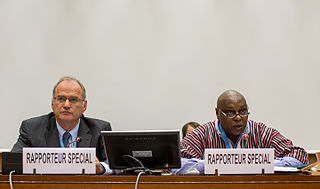
Devolution is the statutory delegation of powers from the central government of a sovereign state to govern at a subnational level, such as a regional or local level. It is a form of administrative decentralization. Devolved territories have the power to make legislation relevant to the area, thus granting them a higher level of autonomy.

Paul Okalik is a Canadian politician. He is the first Inuk to have been called to the Nunavut Bar. He was also the first premier of Nunavut.
The Canada Revenue Agency is the revenue service of the Canadian federal government, and most provincial and territorial governments. The CRA collects taxes, administers tax law and policy, and delivers benefit programs and tax credits. Legislation administered by the CRA includes the Income Tax Act, parts of the Excise Tax Act, and parts of laws relating to the Canada Pension Plan, employment insurance (EI), tariffs and duties. The agency also oversees the registration of charities in Canada, and enforces much of the country's tax laws.

Special rapporteur is the title given to independent human rights experts whose expertise is called upon by the United Nations (UN) to report or advise on human rights from a thematic or country-specific perspective.
The Federal Public Sector Labour Relations and Employment Board is an independent quasi-judicial tribunal that administers the collective bargaining and "grievance adjudication systems" in Canada's federal public service and in Parliament.
Manitoba Justice, or the Department of Justice, is the provincial government department responsible for administering the Crown Law justice systems in the province of Manitoba.
The British Columbia Human Rights Tribunal is a quasi-judicial human rights body in British Columbia, Canada. It was established under British Columbia's Human Rights Code. It is responsible for "accepting, screening, mediating and adjudicating human rights complaints."

Human rights in Canada have come under increasing public attention and legal protection since World War II. Prior to that time, there were few legal protections for human rights. The protections which did exist focused on specific issues, rather than taking a general approach to human rights.

The Prince of Wales Northern Heritage Centre (PWNHC) is the Government of the Northwest Territories' museum and archives. Located in Yellowknife, Northwest Territories, Canada, the PWNHC acquires and manages objects and archival materials that represent the cultures and history of the Northwest Territories (NWT), plays a primary role in documenting and providing information about the cultures and history of the NWT, and provides a professional museum, archives and cultural resource management services to partner organizations.

Hate speech laws in Canada include provisions in the federal Criminal Code, as well as statutory provisions relating to hate publications in three provinces and one territory.
The Nova Scotia Human Rights Commission was established in Nova Scotia, Canada in 1967 to administer the Nova Scotia Human Rights Act. The Nova Scotia Human Rights Commission is the first commission in Canada to engage a restorative dispute resolution process.

The Saskatchewan Human Rights Commission is a body within the Government of Saskatchewan whose mission is "To promote and protect the individual dignity, fundamental freedoms and equal rights of Saskatchewan citizens." It enforces the Saskatchewan Human Rights Code.

The Business Development and Investment Corporation (BDIC) is a territorial Crown corporation wholly owned by the Government of the Northwest Territories. Its mandate is to help create and develop Northwest Territories businesses through financing, subordinate financing, venture capital and consulting services, with a focus on small and medium-sized enterprises.

The Venezuelan Human Rights and Democracy Protection Act is a bill that would impose sanctions against Venezuela and authorize appropriations to support civil society in that country. The sanctions would be directed at any government official who was involved in the mistreatment of protestors. Sanctioned officials would have their assets frozen and would not be able to travel to the United States.
The Alberta Human Rights Commission (AHRC) is a quasi-judicial human rights commission in Alberta, Canada, created by the provincial government.
The Proposed British Bill of Rights was a proposal of the Second Cameron ministry, included in their 2015 election manifesto, to replace the Human Rights Act 1998 with a new piece of primary legislation.

The Real Estate Authority (REA), formerly the Real Estate Agents Authority (REAA), is the New Zealand Crown entity responsible for the regulation of the New Zealand real estate industry as well as the agents within it.

The Department of Human Settlements and Urban Development, abbreviated as DHSUD, is the executive department of the Philippine government responsible for the management of housing and related development in the Philippines. The department is led by the Secretary of Human Settlements and Urban Development, as appointed by the President of the Philippines and confirmed by the Commission on Appointments. The secretary would be assisted by three Undersecretaries and three Assistant Secretaries, that would be appointed by the President upon the recommendation of the Secretary.

The Gwichʼin Tribal Council is a First Nations organization representing the Gwichʼin people in the Mackenzie River Delta of the Northwest Territories. It was created in 1992 with the final ratification of the Gwichʼin Comprehensive Land Claim Agreement with the Government of Canada. Negotiations to achieve a Final Agreement, and thus, Gwichʼin self-government, are ongoing.











